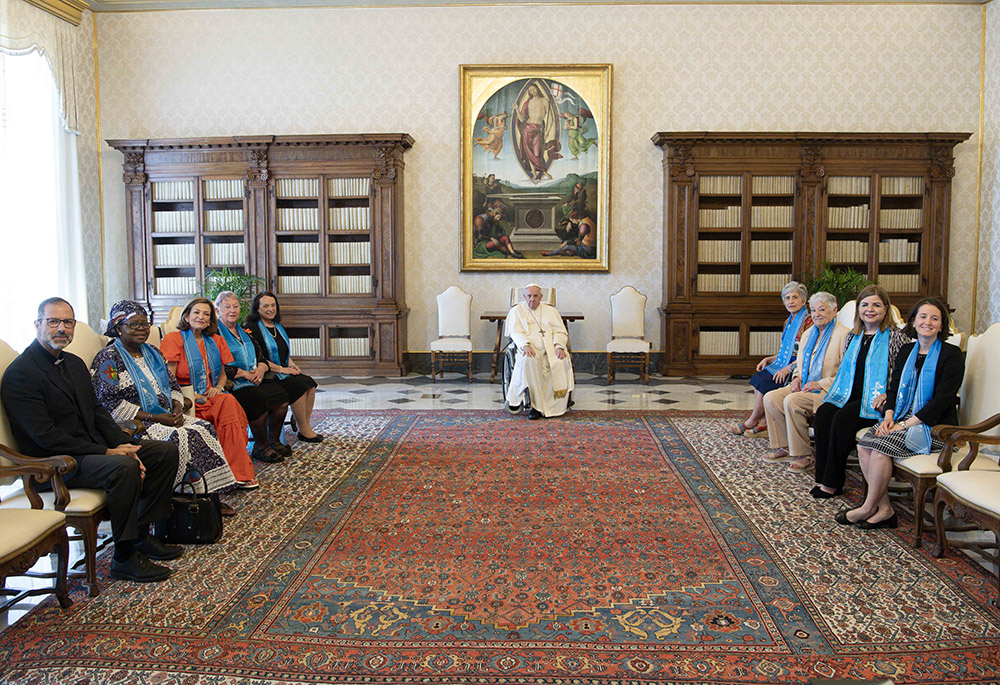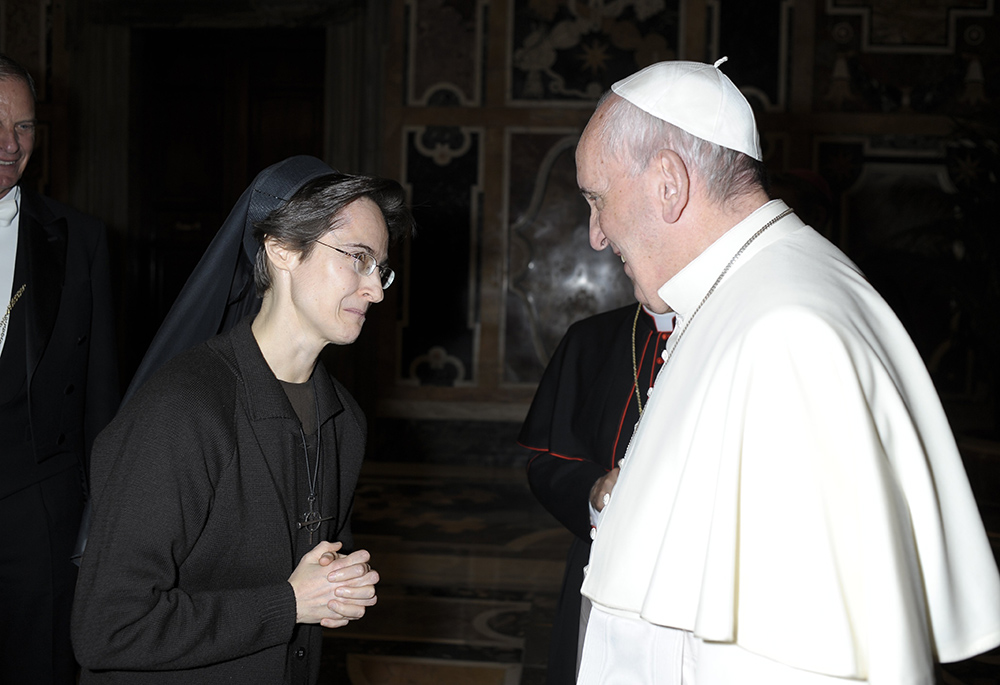
Pope Francis meets with a delegation from the World Union of Catholic Women's Organizations in the library of the Apostolic Palace June 11 at the Vatican. The Vatican announced July 13 that the pope had named Maria Lia Zervino, president of the union, seated nearest the pope on the right, to be a member of the Dicastery for Bishops. (CNS/Vatican Media)
Reforming the church has been compared to turning a large ship around: You can't hurry the task or you risk capsizing the ship. Last week (July 13), however, Pope Francis hurried his reforms quite a lot. The appointment of three women to serve on the Dicastery for Bishops is an enormous change in the life of the Roman Curia and in the life of the universal church.
The Dicastery, known as the Congregation for Bishops until the reforms Francis implemented on Pentecost, is the body that receives the ternas — lists of three candidates — from the apostolic nuncios scattered around the globe for all open bishoprics that are not located in mission territory. The Dicastery for Evangelization handles the ternas for mission dioceses and the Dicastery for the Eastern Churches handles Eastern-rite Catholic appointments. The dicasteries review the nominations, and then can approve the terna and send it to the pope, modify the terna by, say, changing the order of the names, or reject the terna and ask the nuncio to start over.
Most popes, especially once they have been in office for a bit, will have some ideas about whom they might wish to appoint to a major diocese. But most of the appointments are to smaller, less prominent dioceses, and no pope would have a handle on the vast number of priests who might be candidates. Most of the ternas that come to him from the Dicastery for Bishops get approved. That means the members of that congregation wield an enormous influence over the selection of the next generation of church leaders.
Women have been involved in the selection of bishops before, but only when the process was largely in the hands of secular rulers. Through much of early modern church history, a Catholic sovereign had the right to nominate candidates for open bishoprics. In addition to powerful women sovereigns like Empress Maria Theresa of Austria, it was not unknown that a king's mistress might exercise influence over the process. Madame de Maintenon, the Jansenistic mistress to Louis XIV, helped put Louis-Antoine de Noailles on the cathedra at Notre Dame de Paris in 1695.
Advertisement
In the late 19th and early 20th century, however (and ironically often because of the separation of church and state, which the Catholic Church fought), the pope gained control over the process of naming bishops in most countries. The task of naming candidates was entrusted to Vatican diplomats and the Consistorial Congregation, as it was then known, and it became the Congregation for Bishops in the reforms after Vatican II. Popes have never had as much power over the universal church as they have in the last two centuries.
Now women will be part of the process again. Two religious sisters — Franciscan Sister of the Eucharist Raffaella Petrini and Daughters of Mary Help of Christians Sr. Yvonne Reungoat – and one laywoman, Maria Lia Zervino, will help the pope choose the next generation of church leaders. It is virtually impossible to overstate how overdue the involvement of women in ecclesial decision-making is.
Petrini has a U.S. connection: The generalate and motherhouse of her order is located in Meriden, Connecticut, an old mill town that has seen better days.
More is at work here than the introduction of women into decision-making roles. Zervino is a layperson. The decision to decouple decision-making authority from ordination touches on deep theological issues.

Pope Francis greets Sr. Raffaella Petrini, an Italian member of the U.S.-based Franciscan Sisters of the Eucharist, Dec. 3, 2015, at the Vatican. (CNS/Vatican Media)
The pope is declericalizing decision-making in the church, opening posts to non-clerics and those not under vows. There is something to be said for entrusting decision-making in the church to those who have taken a vow or promise of obedience. Our Lord's life and ministry, and especially his passion and death, were marked above all by his obedience to the Father, and so that church that carries the Lord's name and continues his ministry must center obedience in its internal life. I worry that the laity too easily forget that obedience, like prayer and suffering, are the true sources of power in the Christian faith.
But we shall see. The mash-up clericalism has perpetrated on the church in our time has certainly made it necessary to try something new. The vow of obedience was not enough to prevent the practice of arrogance.
This declericalization of decision-making invites the whole church, including the clergy, to see ordination for what it is, a gift. If we view ordination as a ticket to authority and power, we will very quickly turn the clerical state into a breeding ground for pride, not a vehicle for grace. The camaraderie appropriate to the presbyterate will become — and has become — cliquish and unhealthy. Concern to protect the institution's power and assets overtook concern to protect the institution's integrity and mission.
These reforms, then, are not just about rearranging assignments on an organizational chart. They are not primarily managerial at all. At their deepest level, the reforms renew the church both in light of contemporary needs but also from the wellspring of our theology of grace. Francis, with his call for a universal synodal process, is inviting us all to attend to these deeper issues. In his reform of the curia, he is showing what attending to such deeper issues can yield.








